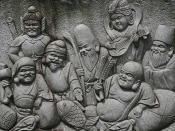Maimonides and Aquinas, two incredible spiritual academics from many centuries ago, differ greatly in the names and language which mankind can pertain to God. Maimonides, a Jewish philosopher, took the stance that God can only be expressed by the things or attributes which He is not. The only other way God can begin to be expressed is through His actions, but these actions in no way reflect His true essence. Aquinas, on the other hand, disagreed with his counterpart. He felt that no words or articulation would in any way do justice to God's divinity, and the name God can only be thought of as an abstraction. Therefore, neither positive nor negative attributes can be credited to God.
Maimonides introduces the reader to the dilemma he has with applying language to God in book I of his Guide of the Perplexed. He explains that if something has an attribute, it must fall under one of five categories.
His first class deals with things which can be expressed by its definition. He provides us with an example of this by defining man as a reasoning animal. This though, cannot accurately define God since he has no pre-existing causes which would therefore define his nature. His next category breaks the definition of the thing into its parts. For example, man would thus be expressed as both 'animal' and 'rational'. This type of definition though also does God no justice. Since he is not constructed of any parts, his nature cannot be broken down into parts. The third grouping deals with quality, and comparing something to something else. This proof is quickly shot down by Maimonides because it implies that God is composite. This can be credited to the fact that quality is a type of accident. Since God is...


